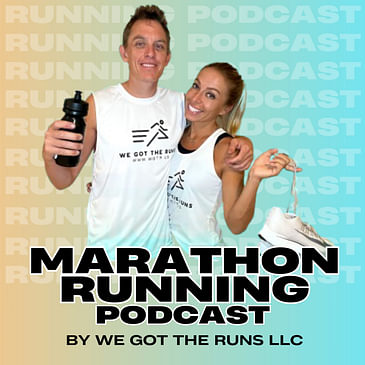In this week's episode of the Marathon Running Podcast, we delve into the intricacies of Energy Metabolism with Dr. Patrick Davitt, PhD, shedding light on crucial aspects that impact every runner's performance. We start by exploring the fundamental definition of Energy Metabolism and the role of ATP, the energy currency of our cells.
Fueling takes center stage as we discuss its paramount importance during training runs, emphasizing the need to maintain blood glucose levels and supply energy to working muscles. The intriguing question arises: Can running in a "depleted" state, without eating before a run, actually benefit our body's adaptation? Dr. Davitt unravels the complexities of liver-stored glycogen versus muscle-stored glycogen,detailing the nuances of fuel partitioning, substrate metabolism, and the burning of carbohydrates or fats.
The conversation extends to the adaptation of running in a fasted state or consuming slow-absorbing foods, exploring their impact on handling the later miles in a marathon. Dr. Davitt provides insights into the prevailing trend of fueling all runs and challenges the notion, pointing out that exceeding 60g of carbohydrates per hour lacks supporting data for performance improvement.
As an endurance runner, understanding the ideal fueling strategy becomes crucial, with protein playing a role in replenishment and repair, and varying macronutrient ratios based on training versus competition. The podcast delves into the peculiar phenomenon of changing tastes in energy gels mid-run, linking it to hormonal changes and attempts at maintaining homeostasis.
Dr. Davitt shares his extensive research on Ucan gels, presenting a study that tested superstarch cornstarch-derived gels against other formulations. The findings highlight the importance of consistency in maintaining stable glucose levels throughout a run. The episode concludes with an exploration of the "glycogen sparing myth" and strategies to prevent the dreaded bonk during a marathon.
Listeners gain valuable insights from Dr. Patrick Davitt's seven years of unbiased research on Ucan, emphasizing his dedication to understanding the science behind energy metabolism and its practical implications for marathon runners.
Free UCAN sample pack: UCAN.co/mrpUse code MRP for 20% off!
Support our podcast and check out our RunSwag Tshirts
· Our website: www.marathonrunningpodcast.com
· Our Instagram: @runningpodcast
· Our Amazon Storefront: Amazon Storefront
· Join our Facebook group: SpeedStriders Facebook Group
· Youtube https://www.youtube.com/@RunningPodcast


